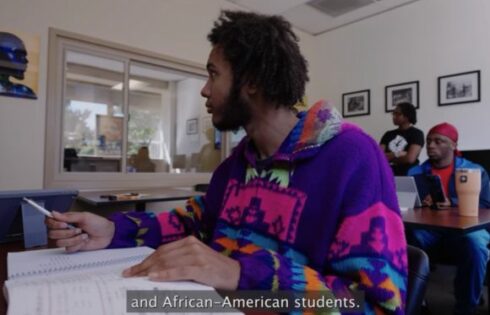
What happens when an entire party refuses to acknowledge the downsides and tradeoffs of their newly sanctified position?
It loses a presidential election it should have won by all rights, as liberal pundit Peter Beinart writes in the latest issue of The Atlantic.
The subject is immigration, and Beinart traces the path from the Democratic Party’s skepticism of illegal immigration in the second George W. Bush term to today’s full-throated worship of all things undocumented, H-1B and culturally separatist:
In 2014, the University of California listed melting pot as a term it considered a “microaggression.” What if Hillary Clinton had traveled to one of its campuses and called that absurd? What if she had challenged elite universities to celebrate not merely multiculturalism and globalization but Americanness?
What really jumped out at me in the excellent article, however, was Beinart’s discussion of how politicized academic research on immigration has become, creating the veneer of consensus:
Many of the immigration scholars regularly cited in the press have worked for, or received funding from, pro-immigration businesses and associations. Consider, for instance, Giovanni Peri, an economist at UC Davis whose name pops up a lot in liberal commentary on the virtues of immigration. … Such grants [from pro-immigrant sources] are more likely the result of his scholarship than their cause. Still, the prevalence of corporate funding can subtly influence which questions economists ask, and which ones they don’t. …
Academics face cultural pressures too. In his book Exodus, Paul Collier, an economist at the University of Oxford, claims that in their “desperate [desire] not to give succor” to nativist bigots, “social scientists have strained every muscle to show that migration is good for everyone.” George Borjas of Harvard argues that since he began studying immigration in the 1980s, his fellow economists have grown far less tolerant of research that emphasizes its costs. There is, he told me, “a lot of self-censorship among young social scientists.”
That spirit of self-censorship – a response to the dominance of faculty who think they already have all the answers – is what worries Finnegan Schick, a senior at Yale University and intern at the cultural affairs journal The New Criterion.
A self-identified “center-left” Hillary Clinton voter, Schick writes for Heterodox Academy that he doesn’t want to live and study in an ideological bubble, contrary to how his professors treat him:
It’s been over 7 months since [Donald] Trump was elected, yet my professors show no signs of putting their political digressions on hold. The spread of this phenomenon to subjects like Literature and English reflects a troubling trend: the growing partisanship of higher education. …
Because my English professors at Yale are largely liberal, the political message in my classes is always the same: Trump is a demagogue, American society is doomed, and English literature is our refuge. Liberal professors and students increasingly feel that it is their duty as professors and humanists to promote their vision of the political good. Meanwhile, the remaining campus conservatives have become less outspoken and remain fearful that they may suffer academically as well as socially for their views.
Schick’s discipline, once political on the margins, “is being politicized at the expense of timeless truths,” he says:
I chose to study English because I wanted to improve my writing and reading abilities, because I value the literature of the language I speak, and because some aspects of the human condition are only accessible through books, plays, and poems. Reading Shakespeare should, of course, inform the way we think about systems of government, political leaders, and historical change. But it shouldn’t require an “I’m With Her” sticker and a subscription to The Washington Post. One will have a difficult time deciphering the hidden nuances of Julius Caesar if one is determined to view his character through the prism of current events.
Literature is ideally a way of broadening our social imaginations. If authors are only worth reading insofar as they inform modern phenomena, then the entire English canon is of mere antiquarian interest and can be summarily dismissed.
I’m sorry to tell Schick that I think the summary dismissal of anything that does not flatter the latest academic vanities is exactly where his discipline is headed.
MORE: ‘America is the land of opportunity’ banned from classroom
Like The College Fix on Facebook / Follow us on Twitter
IMAGE: A Clockwork Orange






Please join the conversation about our stories on Facebook, Twitter, Instagram, Reddit, MeWe, Rumble, Gab, Minds and Gettr.